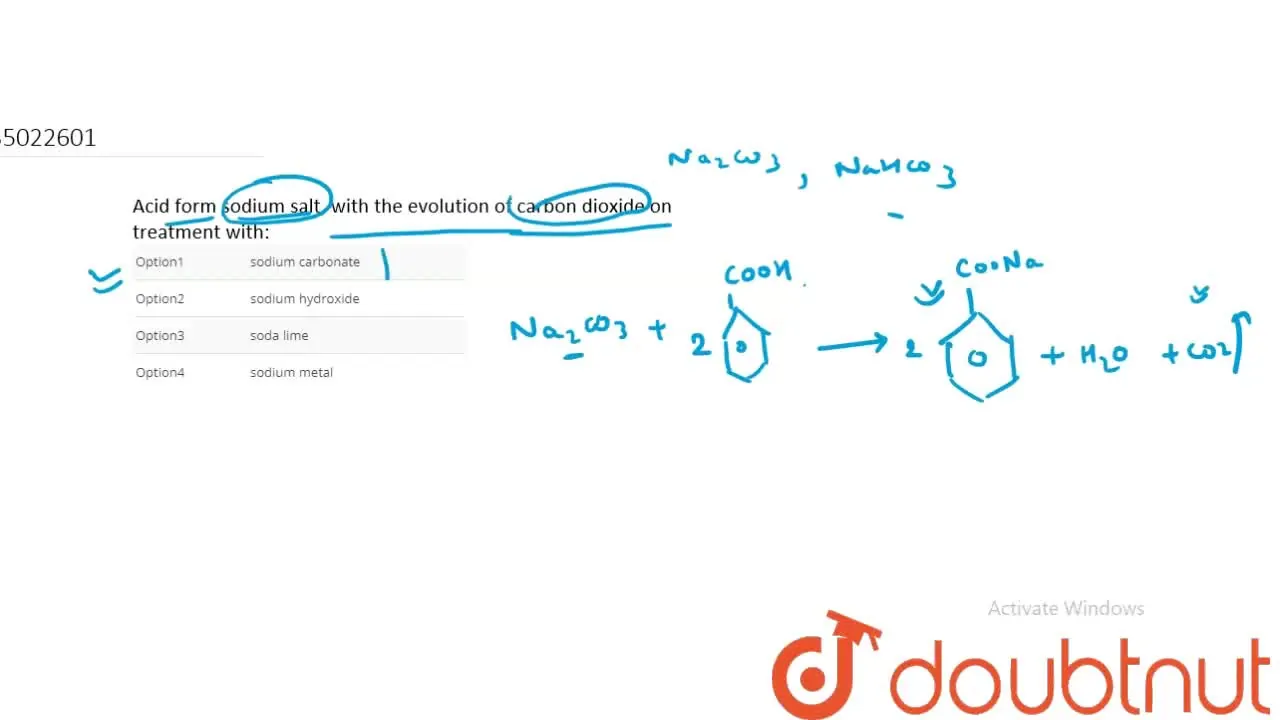Acid form sodium salt, with the evolution of carbon dioxide on treatment with:
sodium carbonate
sodium hydroxide
soda lime
sodium metal
The correct Answer is:A
Step by step video, text & image solution for Acid form sodium salt, with the evolution of carbon dioxide on treatment with: by Chemistry experts to help you in doubts & scoring excellent marks in Class 12 exams.
Related Playlists
- BOOK - OP TANDONCHAPTER - CARBOXYLIC ACIDS AND THEIR DERIVATIVESEXERCISE - Integer4videos
CARBOXYLIC ACIDS AND THEIR DERIVATIVES
- BOOK - OP TANDONCHAPTER - CARBOXYLIC ACIDS AND THEIR DERIVATIVESEXERCISE - Brain storming problems30videos
CARBOXYLIC ACIDS AND THEIR DERIVATIVES
- BOOK - OP TANDONCHAPTER - BASIC PRINCIPLES OF ORGANIC COMPOUNDS (MECHANISM OF ORGANIC REACTIONS)EXERCISE - SINGLE INTEGER ANSWER TYPE QUESTIONS4videos
BASIC PRINCIPLES OF ORGANIC COMPOUNDS (MECHANISM OF ORGANIC REACTIONS)
- BOOK - OP TANDONCHAPTER - CHEMICAL KINETICSEXERCISE - LINKED COMPRESHENSION TYPE QUESTIONS ( SECTION-VI)4videos
CHEMICAL KINETICS
Similar Questions
The reagent that reacts with acetic acid to give sodium acetate with liberation of carbon dioxide gas is
View SolutionWhich of the following substance will not give carbon dioxide on treatment with dilute acid ?
View SolutionWhich of the following substances will not give carbon dioxide on treatment with dilute acid ?
View SolutionWhich of the following substances will not give carbon dioxide on treatment with dilute acid ?
View SolutionThe compound, which evolves carbon dioxide on treatment with aqueous solution of sodium bicarbonate at 25∘C, is
View SolutionSodium carbonate reacts with ethanoic acid to form sodium ethanote, carbon dioxide and water. In an experiment, 5.3 g of sodium carbonate reacted with 6 g of ethanoic acid to form 8.2 g of sodium ethanoate, 2.2 g of carbon dioxide and 0.9 g of water. Show that this data verifies the law of conservation of mass.
View SolutionIn a reaction, 5.3 g of sodium carbonate reacted with 6 g of acetic acid. The products were 2.2 g of carbon dioxide, 0.9 g water and 8.2 g of sodium acetate. Show that these observations are in agreement with the law of conservation of mass.
sodium carbonate + acetic acid → sodium acetate + carbon dioxide + waterView SolutionTreatment of sodium salt of phenol with carbon dioxide under pressure brings about substitution of the carboxyl group, -COOH, for hydrogen of the ring. This provides a path of conversion of phenol into hydroxy carboxylic acids. The acids formed are industrially very important compounds and form many useful compounds.
formed from sodium phenoxide.View SolutionTreatment of sodium salt of phenol with carbon dioxide under pressure brings about substitution of the carboxyl group, -COOH, for hydrogen of the ring. This provides a path of conversion of phenol into hydroxy carboxylic acids. The acids formed are industrially very important compounds and form many useful compounds.
What is the name of the reaction?View SolutionTreatment of sodium salt of phenol with carbon dioxide under pressure brings about substitution of the carboxyl group, -COOH, for hydrogen of the ring. This provides a path of conversion of phenol into hydroxy carboxylic acids. The acids formed are industrially very important compounds and form many useful compounds.
How will you convert the product into aspirin?View Solution


